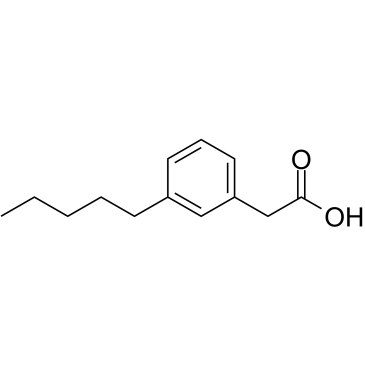PBI-4050
Modify Date: 2025-08-26 01:50:51

PBI-4050 structure
|
Common Name | PBI-4050 | ||
|---|---|---|---|---|
| CAS Number | 1002101-19-0 | Molecular Weight | 206.28100 | |
| Density | N/A | Boiling Point | N/A | |
| Molecular Formula | C13H18O2 | Melting Point | N/A | |
| MSDS | N/A | Flash Point | N/A | |
Use of PBI-4050Setogepram (PBI-4050) acts as an orally active agonist for GPR40 and as an antagonist or inverse agonist for GPR84[1]. Setogepram (PBI-4050) decreases renal, liver and pancreatic fibrosis[1][2]. Setogepram (PBI-4050) exerts anti-fibrotic, anti-inflammatory and anti-proliferative actions[2]. |
| Name | (3-pentylphenyl)acetic acid |
|---|---|
| Synonym | More Synonyms |
| Description | Setogepram (PBI-4050) acts as an orally active agonist for GPR40 and as an antagonist or inverse agonist for GPR84[1]. Setogepram (PBI-4050) decreases renal, liver and pancreatic fibrosis[1][2]. Setogepram (PBI-4050) exerts anti-fibrotic, anti-inflammatory and anti-proliferative actions[2]. |
|---|---|
| Related Catalog | |
| Target |
GPR40, GPR84[1] |
| In Vitro | Setogepram (PBI-4050; 500 µM; 24 hours) inhibits TGF-β (10 ng/mL)-activated human hepatic stellate cells (HSCs) proliferation[2]. Setogepram (PBI-4050; 250 or 500 µM; 24hours) dose-dependently arrests HSCs at the G0/G1 phase without inducing apoptosis[2]. Cell Proliferation Assay[2] Cell Line: HSCs Concentration: 250 or 500 µM Incubation Time: 24 hours Result: Inhibited TGF-β-activated HSC proliferation. TGF-β (10 ng/mL) increased HSC proliferation by 10%. Cell Cycle Analysis[2] Cell Line: HSCs Concentration: 250 µM, 500 µM Incubation Time: 24 hours Result: Inhibited cell cycle progression. |
| In Vivo | Setogepram (PBI-4050; 100 mg/kg/day; gavage from 8-20 weeks of age) markedly decreases hyperglycemia and markedly improvea glucose tolerance in type 2 diabetes eNOS-/-db/db mice[1]. Animal Model: Type 2 diabetes eNOS-/-db/db mice[1] Dosage: 100 mg/kg/day Administration: Given via daily gavage from 8-20 weeks Result: Compared with vehicle-treated mice, hyperglycemia was markedly decreased, and glucose tolerance was markedly improved. |
| References |
| Molecular Formula | C13H18O2 |
|---|---|
| Molecular Weight | 206.28100 |
| Exact Mass | 206.13100 |
| PSA | 37.30000 |
| LogP | 3.04640 |
| Storage condition | -20°C |
| 3-pentylphenylacetic acid |